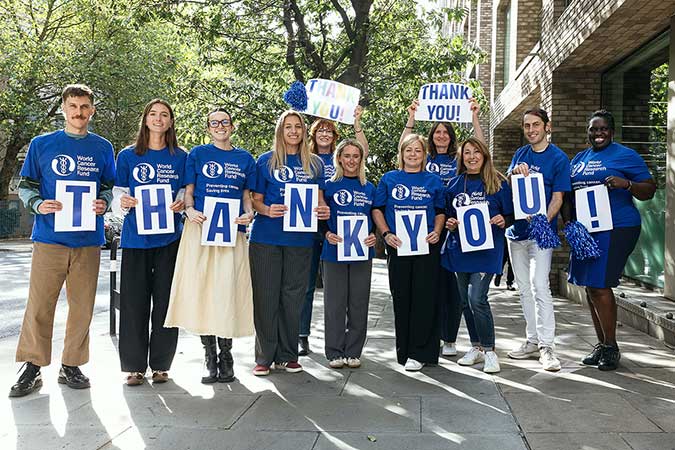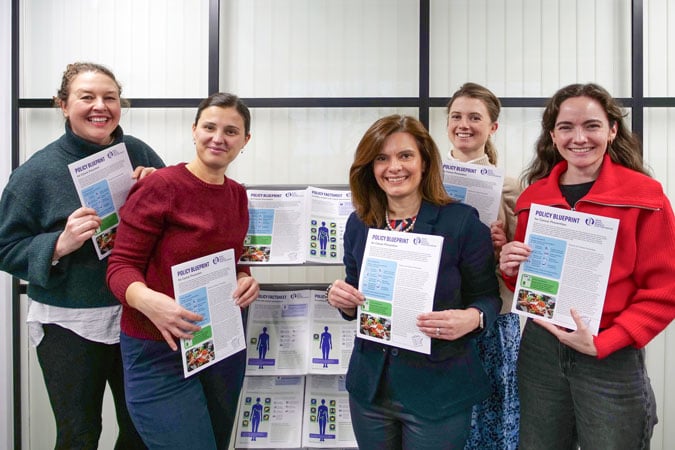Grant title: The MENAC trial: a randomised, open-label trial of a Multimodal Intervention (Exercise, Nutrition and Anti-inflammatory Medication) plus standard care vs standard care alone to prevent cachexia in advanced cancer patients undergoing chemotherapy
Background
Patients with cancer frequently experience weight loss, which can cause decreased physical function, shortened survival and an overall reduced quality of life. It can follow as a consequence of cancer cachexia. Cancer cachexia is a wasting syndrome that develops by a combination of reduced food intake and the body’s altered ability to utilise nutrients arising from interactions between cancer-induced inflammation, hormonal changes, increased muscle protein breakdown, and reduced ability to build and maintain muscle and fat mass.
Despite increased understanding of the mechanisms of cachexia, there are no standardised practices for management. Ensuring food intake to avoid negative energy and protein balance is thought to be central in the treatment of cancer cachexia, and combining counselling with oral nutritional supplements has shown positive effect on body weight and quality of life. Physical exercise is essential for maintaining muscle mass and can improve muscle strength during cancer treatment.
Previous research suggests that anti-inflammatory drugs such as ibuprofen and omega-3 fatty acids from fish oil may have a positive effect on muscle mass and body weight. The MENAC trial looks at Multimodal-Exercise, Nutrition and Anti-inflammatory medication for Cachexia. Our trial evaluated the implementation and effect of nutritional counselling and supplements containing omega-3 fatty acids, exercise and anti-inflammatory drugs. A pilot study showed that the trial was safe and feasible, and the multifaceted intervention resulted in a maintenance of body weight.
Aims and objectives
The central hypothesis of this trial was that a multifaceted intervention, delivered during palliative chemotherapy in patients with advanced lung or pancreatic cancer, prevents the development or attenuates the effect of cancer cachexia. Direct effects from the cachexia intervention were expected to be a reduction in weight and muscle loss, an improvement in physical activity and muscle strength, and improvement in survival and quality of life.
The main objective was to test the differences between the treatments on change in body weight at 6 weeks after randomisation. We tested differences between the treatments on change in muscle mass and physical activity at 6 weeks after randomisation.
Methods
The MENAC trial was a randomised trial conducted across 17 sites in 4 countries. Patients with stage 3 or 4 lung or pancreatic cancer receiving systemic anti-cancer treatment with non-curative intent were randomly assigned to a multimodal intervention or standard care. The multimodal intervention consisted of nutritional counselling plus fish oil containing oral nutritional supplements, physical exercise (endurance and strength) and non-steroidal anti-inflammatory drugs (NSAIDs).
Results
From May 2015 to February 2022, 212 patients were enrolled.
Over 6 weeks, weight stabilised in patients assigned to multimodal treatment compared with those assigned to standard care. There was no conclusive difference in muscle mass or in mean step counts.
We can conclude that multimodal treatment is safe and no patients discontinued due to intolerable toxicity or adverse event related to ibuprofen or any of the other interventions. Patients are willing and able to participate and compliance with interventions was acceptable.
Conclusion
A multimodal cachexia intervention stabilised weight compared with standard care at 6 weeks. There was no difference in physical activity or muscle mass between the groups.
Impact
The intervention in the MENAC trial aims to establish a practical rehabilitation programme that will provide the first evidence-based method to reverse this syndrome that affects patients with advanced cancer. This trial, which included patients from multiple countries, will help improve standardisation of rehabilitation of patients undergoing anticancer therapy and has already generated massive excitement both in the clinical cachexia community and among clinical oncologists.



